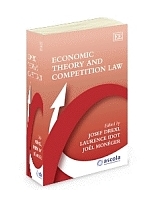The context for this book is the increasingly complex relationship between
economic theory and competition law which gives rise to lively political and academic
debate on the direction competition law should take in a more global and
innovation-oriented market place.
The authors adopt a comparative, research-orientated approach, taking into account
different situations in the US, Europe, Japan and transition and developing countries.
They investigate the impact of economics on the objectives of competition law in various
fields – restrictive agreements, unilateral restraints and merger control – and on the
effectiveness of enforcement in a given legal and judicial system.
Economic Theory and Competition Law is an insightful resource for law and economics
scholars. Legal practitioners in the field of competition law will also value this book.
Economic Theory and Competition Law constitutes a timely, stimulating contribution to
the ongoing debate on the current trends of competition enforcement, not only in Europe
but also in other jurisdictions, and especially on the impact that applying the concepts
and the categories of economic theory is going to have on this activity. . . Due to its
coverage and timeliness, it is very likely to have a considerable impact on the current
discussion and also to be of interest to both academics and practitioners active in the
field of competition law and policy.’
– Arianna Andreangeli, Common Market Law Review
Edited by Josef Drexl, Director, Max Planck Institute for Intellectual
Property, Competition and Tax Law, Munich, Germany, Laurence Idot,
Professor of Law, University of Paris II Panthéon-Assas and Joël Monéger,
Professor of Law, University of Paris Dauphine, France
Contents:
Preface
PART I: THE GOALS OF COMPETITION LAW – A COMPARATIVE PERSPECTIVE
1. Economic Analysis in EU Competition Cases
Hans W. Friederiszick
2. Competition Law and the Institutional Embeddedness of Economics
David J. Gerber
3. The Goals of Japanese Competition Law
Shuya Hayashi
4. Efficiency of Competition Law in Economies of Transition
Luboš Tichý
5. The Treatment of Efficiencies in South African Merger Consideration
Geoff Parr
PART II: THE STATUS OF EFFICIENCY ANALYSIS IN COMPETITION LAW
6. Should Competition Law Promote Efficiency? Some Reflections of an Economist on
the Normative Foundations of Competition Law
Wolfgang Kerber
7. Competition Law Should Promote Economic and Social Welfare by Ensuring the
Freedom to Compete – A Lawyer’s View
Roger Zäch
8. Appropriation of the Legal System by Economic Concepts: Should Conflicting
Goals be Considered?
Anne Perrot
9. Competition Law and Public Policy: Reconsidering an Uneasy Relationship – The
Example of Article 81
Heike Schweitzer
PART III: ECONOMIC ANALYSIS AND COMPETITION LAW IN PRACTICE
10. Restrictive Agreements and Unilateral Restraints: Merging Regimes on Market
Power and Exclusion
Thomas Eilmansberger
11. Convergence of Competition Law Prohibitions: Foundational Issues
Michal S. Gal
12. Efficiencies in Merger Analysis: Alchemy in the Age of Empiricism?
Thomas L. Greaney
13. Efficiency in Merger Law: Appropriateness of Efficiency Analysis in Ex-ante
Assessment?
Daniel Zimmer
14. Efficient and/or Effective Enforcement
Marie-Anne Frison-Roche
15. A Brief Overview of Some Conflicts between Economic Efficiency and
Effectiveness of the Administrative or Judicial Process in Competition Law
Antoine Louvaris
16. Conflicts between Economic Efficiency and Effective Judicial Process
Muriel Chagny
PART IV: GUEST SPEECH
17. Efficiency in the Enforcement Policy of the French Conseil de la Concurrence
Bruno Lasserre
Index
288 pages, Hardcover
Księgarnia nie działa. Nie odpowiadamy na pytania i nie realizujemy zamówien. Do odwolania !.


